
Letter from the Chair
Welcome to our 2020 newsletter.
A particularly warm welcome to all the 2020 graduates who missed out on the opportunity to participate in the ancient (maybe a millennium?) tradition of wearing academic dress, and the much more recent tradition of having a graduation picture taken in front of the 'Waterloo sign' at University Ave. It has only been around since 2012, and now the sign will be moved for safety reasons!
A lot of things have changed in a pretty short time frame recently in the name of safety. It has challenged our personal (and the institution's) ability to be flexible and adaptive: turns out that these positive attributes are more easily espoused as desirable principles in the confines of a classroom. But, with a tremendous amount of effort by everyone, we have all managed remarkably well!
As part of this, economics recorded a University First: We were the first department to have a one hundred percent virtual/remote PhD Thesis defense! As a matter of fact, we had four successful remote PhD defenses. Personally, I cannot even imagine the additional stress caused by the nagging question if the internet will stay up never mind the regular stress involved in remembering why equation 3.24(a) is clearly crucial and 'obvious'; or the lack of reassuring glances from your supervisor during the proceedings. Congratulations, Doctors of Philosophy (in Economics)!
Yet, most of the time since our last newsletter was 'normal' and filled with all the usual cool and exciting (and mundane) things we do. We had another great edition of our Distinguished Lecture in the fall, for example. While I would usually announce this year's presentation, there will be a hiatus while we are working on concepts (and funding) for a version 2.0 to carry us forward.
There is one other key change in the department many a recent graduate will relate to: Becky Moore has accepted a job at the Arts Undergraduate Advising Office. We are proud of her and happy for her for this career step!
With all these changes from the micro to macro scales one thing has not changed: our connection to you, through this newsletter. You can follow the department and some of its members on social media and you can of course always send any of us emails! On second thought promote the post office and send an old-timey tourist postcard for Pat Shaw's display board in the department. I would love some new sights, once they let us back into Hagey Hall!
Stay in touch, wishing you good health,
Lutz-Alexander Busch
Chair, Economics Department

Photo Credit: Joe Grilec
Inside this issue
Exciting learning opportunities made possible by our alumni donors
Announcing: A New Undergraduate Scholarship!
Economics graduate student John Baker analyzes spending responses to policy in real time
Research Highlight: Annie Pan on the effect of family disruptions on child cognitive outcomes
Graduate seminars by students and for students
Distinguished Lecture in Economics 2019
Update from the UW Economics Society
Just a day before the provincial Medical Officer of Health called for the suspension of in-person classroom meetings last March, we were privileged to host a visit from Rosalie Wyonch, Policy Analyst at the CD Howe Institute in Toronto and a double graduate from Waterloo Economics (BA '13, Honours Mathematical Economics and MA '16, Economics). She spoke to fourth year honours essay students about her experiences with following her curiosity while writing her honours essay.
Responding resourcefully to the questions she posed about the market she was studying set off a series of fortunate circumstances culminating with a position at Canada's premier independent economic research organization. Rosalie also spoke about the necessity of doing economics with integrity and fidelity to copyright rules.
Perhaps most striking was her insight that, when uncertainty is the most prominent feature of the economy, an economics degree is a key strategic asset for job seekers because of the capabilities our graduates build in knowing how to parse that uncertainty into viable strategies and intelligent policy responses.
What a great message, Rosalie! How fortunate that our graduating class of 2020 had the opportunity to engage in all these ideas with you last March!

Photo credit: Yang Zhao, Senior Graphic Designer at CD Howe Institute
Exciting learning opportunities made possible by our alumni donors
Alumni donors have given generously so that graduate students in the Department of Economics could bring their work in progress to conferences like the Canadian Economics Association annual meetings. Congressing with economists from around the world to present at the largest Canadian economics conference is an important milestone for graduate students as they prepare for their careers.
This year, the pandemic changed those plans, and pushed the opportunities to gather and exchange ideas into new time/space configurations – and the great research work behind those planned presentations remains just as strong!
Daneal O'Habib was one of only 10 undergraduates asked to present original research papers as finalists in the CEA virtual poster session, jointly sponsored by the association and the Bank of Canada.
Zehua Pan, one of our PhD students who benefitted from alumni conferment support last year, presented a new paper virtually at the European Association of Environmental and Resource Economists conference.
The paper was entitled The Impact of Green Infrastructure on Water Treatment Costs and Drinking Water Incidents: A Spatial Instrumental Variable Regression Model.
Another outstanding moment for graduate students is the university's Three Minute Thesis or 3MT. Yichun Huang participated in the Faculty of Arts heat of this year's competition and did a fantastic job.
You can check out highlights of all of the Arts 3MT competitors' presentations.
A hopeful graduate student community looks forward to presenting at the 2021 Canadian Economics Association meetings.
Announcing: A new undergraduate scholarship!
We are so very grateful to Ms. Armstrong Gates for her support and look forward to providing the first scholarship this fall to a deserving student!
We’re proud of UWaterloo Econ!
Congratulations to all our graduates, from our undergraduate, master’s and doctoral programs! We are so proud of your accomplishments!
Graduate awards
The Graduate Student Celebration this June 2020 was virtual and heartfelt as we celebrated the achievements of our award winners!
- Aidi Yu, a doctoral student in our graduate program, was awarded the 2020 Nihar and Mina Bose Graduate Scholarship. The department’s newest graduate scholarship, this award has been generously funded by Prof. Sukesh Ghosh and his wife Nandita Ghosh to support a deserving PhD student in our program.
- Zehua Pan, another of our doctoral students, was awarded the 2020 Kenneth Stollery Memorial Graduate Award. This award was made possible by Mary Stollery and expanded by donations from her family and friends who have given generously to fund it.
- Xiaohui Wu received the MA Microeconomics award, while Chuanmo Jin received the MA Macroeconomics award.
- Zetian Zhang was the recipient of the MA Econometrics award.
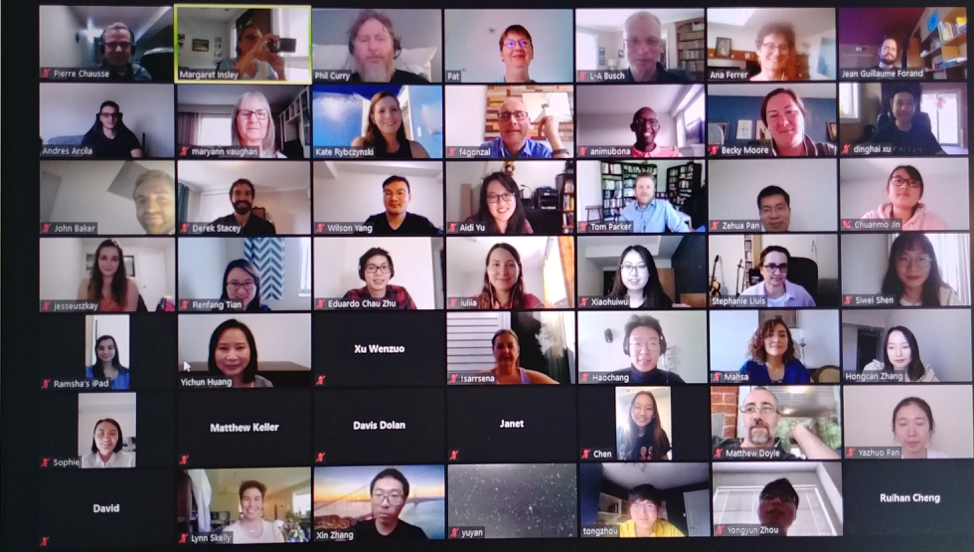
Photos courtesy Margaret Insley and ZOOM

Braving internet connection hiccups and Zoom bombing, four students cleverly led us into the new virtual world by defending their doctoral theses remotely this spring:
- Dr. Andrés Arcila-Vasquez (“Three Essays in Policy Evaluation,” supervised by Dr. Ferrer) is working in quantitative analysis in the Risk Management Department at the TD Bank.
- Dr. Yichun Huang (“The Economics of Water Conservation Regulations in Mining: An Application to Alberta’s Lower Athabasca River Region,” supervised by Dr. Insley) is teaching for our department this fall.
- Dr. Annie Yazhuo Pan (“Essays in Wealth Effect, Family Structure and Female Labour Supply,” supervised by Dr. Ferrer and Dr. Lluis) is joining the Canada Pension Plan Investment Board.
- Dr. Renfang Tian (“On Functional Data Analysis: Methodologies and Applications,” supervised by Dr. Chen) is taking up a position at King’s University College, Western University.
Undergraduate awards
- Qingyi Yan won the 2020 Alumni Gold Medal for the Faculty of Arts, in recognition of outstanding academic performance during her undergraduate studies in Mathematical Economics. Congratulations on your excellent work, Qingyi!
- 2019-2020 Department Award Recipient: Si Huang
- 2019-2020 2+2 Achievement Award Recipient: Ruoqing Han
- 2019-2020 Senior Honours Essay Award Recipient: Daneal OHabib
- 2019-2020 Honours Economics Award Recipient: Rui Min Zeng
- 2019-2020 Honours Mathematical Economics Award Recipient: Haoyi Lu
- Huayi Liu, who is staying to study in the Master’s program, received honourable mention for his Senior Honours Essay.
Congratulations to our top students of 2019-2020!
Economics graduate student John Baker analyzes spending responses to policy in real time
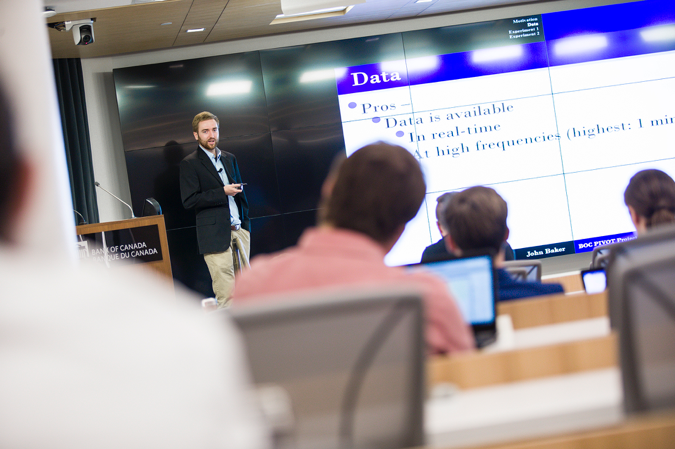
Congratulations, John – what a great experience!
Research Highlight: Annie Pan
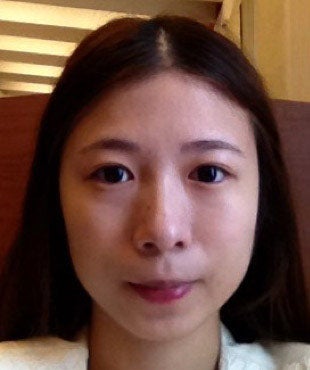
Q: What an interesting project – can you tell us a bit about why this project is important?
House prices in Canada have tripled over the past three decades. Of course, those prices are nominal, but even after adjusting for inflation, real house prices have doubled on average across the country since 1976. Because real estate is the main asset held by families (representing close to half of all household assets in 2016), such rapid increases in the price of housing is a significant factor affecting the distribution of household wealth. While house owners tend to benefit from increasing housing values, renters (many of whom would presumably like someday to be house buyers) tend to face increasing barriers to home ownership. Family wealth including real estate wealth affects many household decisions, such as the household provision of labour, but the linkages between house prices and female labour supply are rarely studied, primarily because of data limitations.
Q: How did you happen to work on this project?
Dr. Ferrer had in the past looked at whether immigrant women increased their labour supply to offset lower family income during the process of settlement in Canada. Dr. Pan and Dr. Lluis together were looking into the effects of divorce laws specifying the distribution of household assets upon marital dissolution on the labour supply of married women. Considering what the impact of big changes in housing prices (and consequent household wealth) would be on the labour market behaviour of Canadian married women spurred a great collaboration that culminated in one of Dr. Pan’s doctoral dissertation chapters.
Q: What was the biggest challenge in this research work?
“It was very time-consuming work, obtaining and organizing the data. We used time-series house price data from the Canadian Real Estate Association's Multiple Listing Service data set (CREA MLS), averaged by real estate board, and linked these to each respondent in the confidential longitudinal household files (SLID) from the Canada Research Data Center Network using geographic information system software. We also had to construct a comprehensive list of topographic instruments for the analysis, variables that could be considered independent of the decision to work, but which were nonetheless likely to affect housing prices, such as the area available for real estate development or changes in terrain elevation.”
Q: Interesting! But the challenge was also the key to the insights in the research, right? What did you find?
“Exactly! In order to estimate the causal effects of housing wealth changes on female labour supply, we used two strategies: Our first strategy was to calculate a measure of house price shocks aimed at capturing unexpected variations in local house prices, as distinct from variations that could be anticipated by people.
Our second strategy was to use the topographic instruments correlated with housing price but not the decision to work, to address reverse causality between the house prices and female labour supply. We found that among house owners, an increase in house price (positive price shocks) caused a reduction in the likelihood of labour force participation of married women. At the intensive margin, we find that an increase in house price shocks induces a decrease in annual work hours of women working low numbers of hours.
Additionally, we find that the effects are more important among women with low levels of education and those living in urban areas. Our research supports the notion that unexpected gains in wealth discourage certain groups of women from working.
Q: Do your results have relevance in the current economic climate?
“Yes: We are currently experiencing unprecedented uncertainty due to the COVID-19 pandemic, which will affect the housing market specifically but more broadly the whole economy. The Canadian Mortgage and Housing Corporation is predicting that the Canadian housing market will see a recession in 2020, especially in the urban centres. In addition, the job destruction resulting from the lockdown and the prospect of a gradual recovery introduces a further negative shock to the income (and wealth) of households. Will the pandemic recession result in an increase in the household’s willingness to supply their labour time to offset some of this wealth loss? Although we did not find evidence that negative wealth shocks increased the labour supply of married women, previous research on immigrant women seems to suggest that, at least for some groups, this would be the case. In any case, the labour market decisions of households are bound to be a source of active labour research in the foreseeable future.”
Dr. Pan graduated with her Ph.D. from the Economics Department of the University of Waterloo, and she is currently working as a researcher at Canadian Pension Plan Investments, in the Research & Innovation Group. She works on a number of projects requiring multi-disciplinary quantitative skills in data analysis and economic modelling, researching several high-quality investment strategies and providing recommendations and suggestions for internal and external investors
Graduate seminars by students and for students
Ever wonder how to get good at presenting? Practice, practice, practice! For doctoral students, the Department of Economics hosts weekly seminar opportunities to get that practice and a lot of great advice and feedback on work in progress – and since September 2019, the graduate seminar series has been open to Ph.D. candidates from other universities. Aidi Yu organizes these seminars, which will be held online this fall. So far, presenters from four other universities have participated, making for a fruitful collaboration with our graduate students and faculty members.
If you would like to receive email invitations to the online presentations (or if you would like to present doctoral work in progress!), please contact Aidi.
Distinguished Lecture in Economics 2019

Last fall, Dr. Janet Currie (Professor of Economics and Policy Affairs and Co-Director of the Center for Health and Wellbeing at Princeton University) gave an engaging lecture on child health and child mental health as critical forms of human capital and the excellent returns to investing in them, in terms of the future possibilities for the child. We also remember fondly the excellent social gathering that followed!
If you missed it, watch Dr. Currie’s informative lecture "Child Health as Human Capital".

Update from the UW Economics Society
The last time we saw each other in person was at the March 12 Economics Society Prof Mixer. Memorable for its excellent hospitality and conversations with students, it is a welcome touchstone to the expectation of a reversion to social proximity, hopefully soon.
Here is a message from our favourite student group:
The Economics Society's mission is to provide students with infrastructure and tools for collaborative engagement, support, and learning. We aim to provide social and academic events throughout the year that contribute to the student experience and promote networking and learning opportunities.
We hope we can return to campus soon, but for now due to COVID-19 we have been actively planning virtual activities for the society. This includes updating our website with new and exciting content such as original articles, undergrad features, alumni features, and interviews with professors. We also have many virtual events planned, including investment workshops and trivia nights.
We are excited for the upcoming year, and we encourage those who are interested in learning more about us to check out our Facebook page, Instagram, as well as our website.
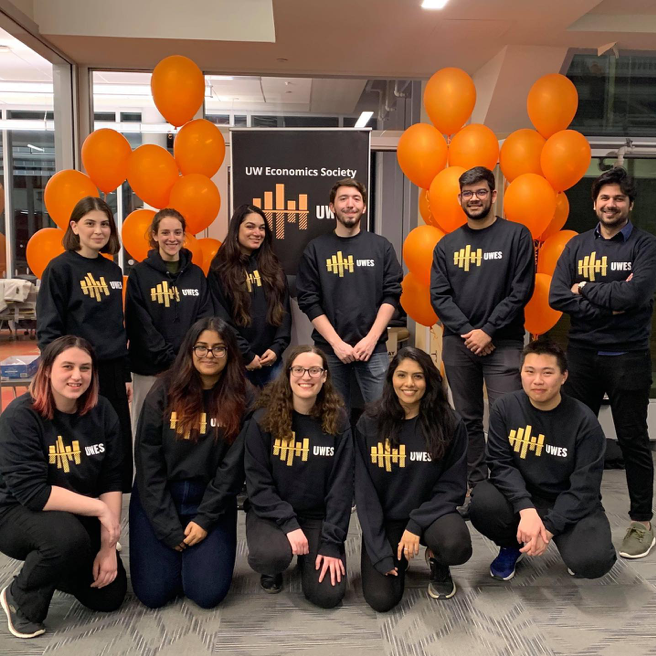
Photo credit: Akshita Verma
If you have any questions about the society or have any feedback you would like to share, please reach out to us at: uw.economics.society@gmail.com
Sincerely,
Christina Salomone and Harshali Padmanabh, Co-Presidents
Puzzle challenge by Corey Van de Waal
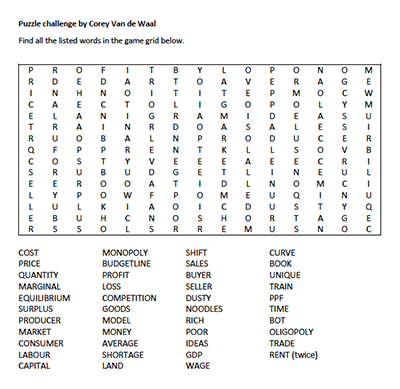
Email this message to us at saarsenault@uwaterloo.ca with your name and a phone number where we can reach you. The first five correct answers will win a $30 gift certificate from the W Store. Good luck!
(Contest is closed to members of the faculty and staff and their families – sorry!)
Want to Connect?
-
The seminar webpage shows all upcoming and past visiting speakers. Everyone is welcome to attend our seminars – please email for details of how to join our virtual seminars.

- Have exciting news to share? We’d love to hear what you are up to!
- Interested in giving a talk? We also love welcoming our alumnae/i to our classes! (And with remote learning, it’s simple!)
- Want to be involved in networking or economic events? Please just ask!
- Want to contribute to our activities? Your donations help fund awards and lectures that make a difference. Please considering reaching out to support us – and thank you!
To connect, please email Lutz-Alexander Busch. To donate, please contact Kim Bardwell or donate online.